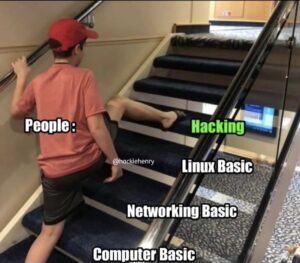WHAT PEOPLE THINK ABOUT BECOME A HACKER
First you should to watch this pictrue. This image show the quick imagination about become a hacker. People think they can directly become a hacker without learn
- Computer Basic
- Networking Basic
- Linux Basic
- Hacking

First you should built a storng understanding of these. So let us discuss all the important topics one by one
Understanding the fundamentals of computers is essential for ethical hacking. As an ethical hacker, you’ll often work with various systems, software, and hardware. A solid grasp of computer basics will enable you to understand how devices function, communicate, and interact. This includes:
- Hardware Components: Knowing the different parts of a computer (CPU, RAM, hard drives, etc.), how they interact, and how they affect system performance.
- Operating Systems: Understanding different operating systems (Windows, macOS, and Linux) is crucial, as hacking often involves understanding how systems behave. The more familiar you are with the architecture and functionalities of these systems, the better.
- Software Fundamentals: You should understand how software runs on computers, how applications interact with the operating system, and how vulnerabilities can exist in these programs.
- Basic Programming: A basic understanding of programming languages like Python, C++, or JavaScript will help you understand how applications are built, and how they can be exploited. You don’t need to be an expert programmer, but knowing the basics will greatly aid in hacking.
Networking knowledge is a core skill for any ethical hacker. Most cyber attacks and ethical hacking activities are done over networks. Understanding how different networks operate, and how devices communicate, is crucial for ethical hacking.
- IP Addressing: Understanding how IP addresses work (IPv4 and IPv6), and how devices on a network communicate with each other. Knowledge of subnets and subnetting is also key for analyzing network traffic and determining vulnerabilities.
- Protocols: Understanding networking protocols like TCP/IP, HTTP/HTTPS, FTP, DNS, and DHCP is essential for ethical hackers. These protocols define how data is transferred over the internet or between devices.
- Firewalls and Routers: Ethical hackers need to know how firewalls, routers, and other network security devices work to protect or exploit a network.
- Ports and Services: Ethical hackers need to know which ports are open on a system and which services are running on those ports (e.g., port 80 for HTTP, port 443 for HTTPS). Scanning open ports can help identify vulnerabilities.
- Wi-Fi and Wireless Security: Knowledge of wireless networks, including Wi-Fi security protocols like WPA2, WEP, and how to identify weaknesses in these protocols, is an important part of ethical hacking.
Many ethical hackers prefer using Linux for their hacking activities, as it is an open-source and flexible operating system with a wide range of hacking tools available. Understanding Linux basics is essential if you want to take full advantage of the tools and techniques used in ethical hacking.
- Linux Command Line: Linux is primarily command-line based, so being comfortable using the terminal is key. Basic commands like
ls,cd,mkdir,cp,mv,rm, and others will help you navigate and manage files in the system. You’ll also need to learn about file permissions, processes, and system monitoring tools. - Linux Distributions for Hacking: There are several Linux distributions that are tailored for penetration testing and ethical hacking, such as Kali Linux, Parrot Security OS, and BackBox. These distros come preloaded with hacking tools like Nmap, Wireshark, Metasploit, and more.
- Networking and Security: Many Linux tools are specifically designed for network scanning, vulnerability assessment, and exploitation. Knowing how to use Linux tools like Nmap for network scanning, Netcat for communication, and Tcpdump for packet analysis will be useful.
- Scripting and Automation: While not strictly necessary at the beginning, learning to script in Bash (Linux’s shell scripting language) will help you automate tasks, which is important for penetration testing. You can write scripts to scan networks, automate attacks, or clean up after your testing.
These three foundational areas will set the stage for more advanced ethical hacking topics.
Once you’ve built a strong understanding of these, you can begin exploring more specialized areas like web application security, cryptography, penetration testing, and advanced tools for ethical hacking.

